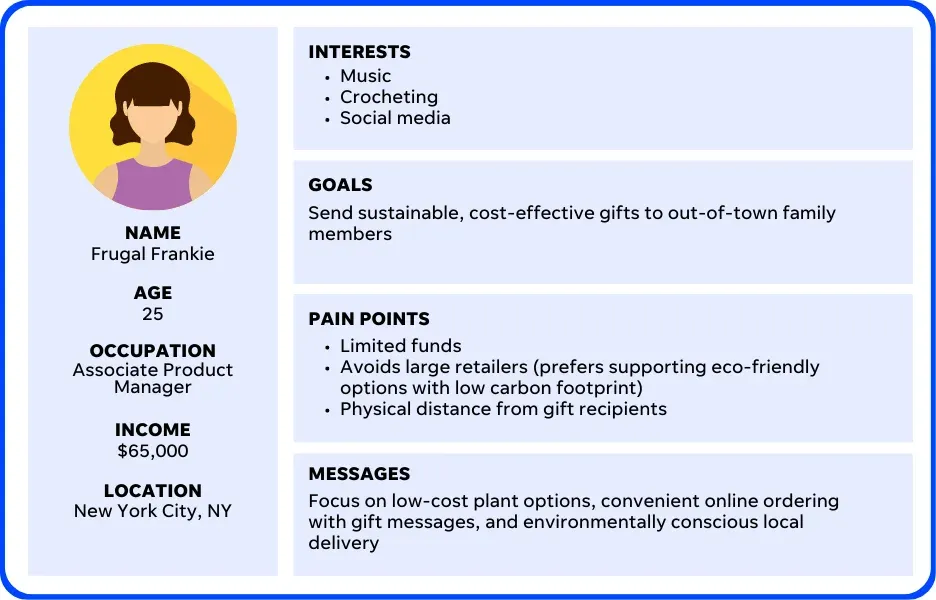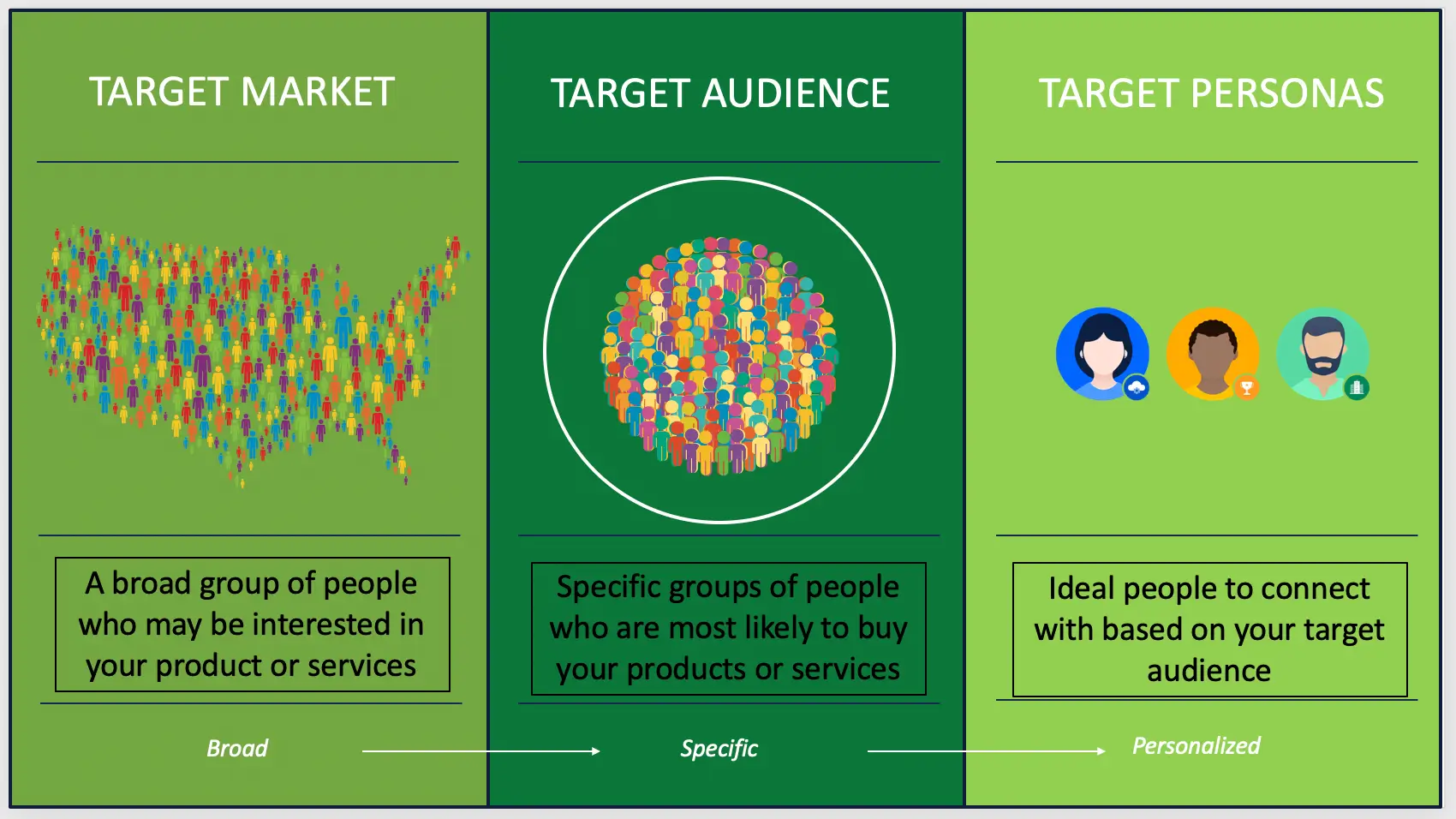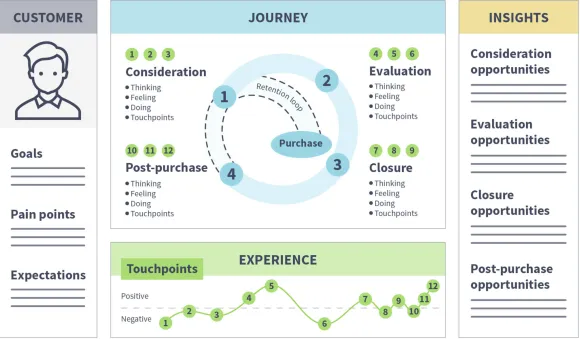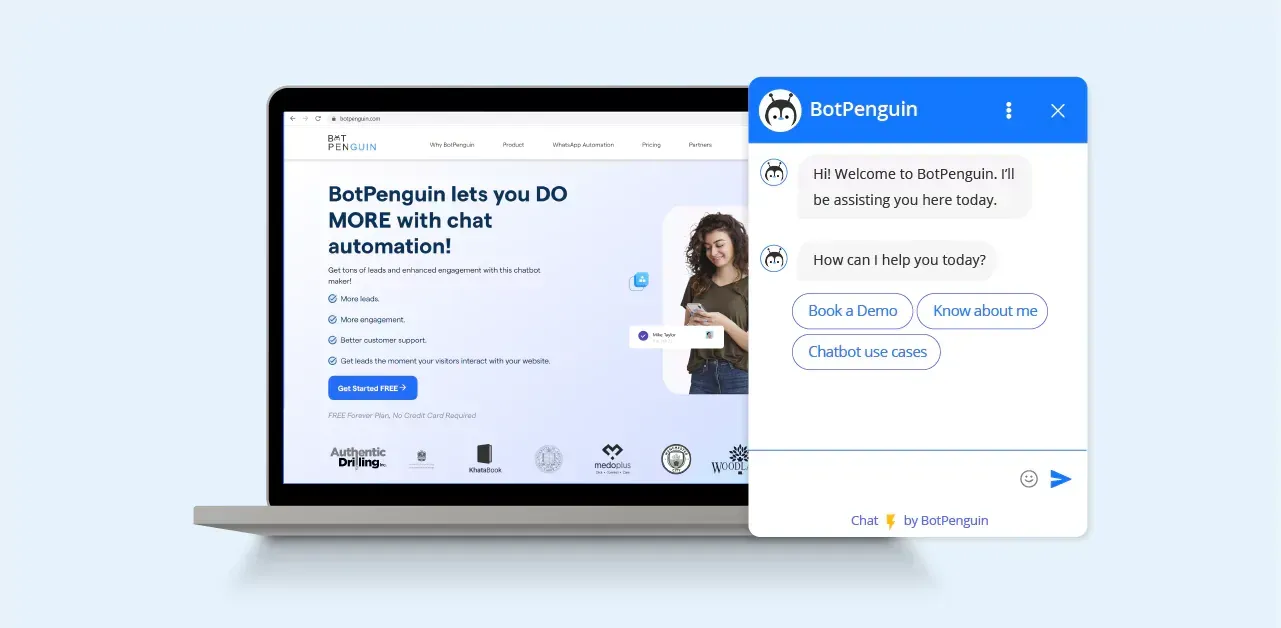Knowing your target audience is crucial for product marketing.
Yet 68% of marketers admit they rely on guesswork, according to Demand Metric. This leaves money on the table.
Savvy marketers instead create detailed buyer personas - fictional representations of ideal customers based on market research data.
In fact, HubSpot found that 79% of companies exceeding revenue goals leverage personas. These living guides identify demographics, behaviors, motivations, and pain points specific to each audience. With this crystal clear view, marketers can craft resonant messaging and truly personalized experiences. McKinsey reports that persona-driven marketing generates 20-30% higher revenue per campaign.
So whether B2B or B2C, invest in developing comprehensive personas. With the ability to hyper-target marketing and boost conversions, buyer personas provide the missing link to unlocking growth and exceeding revenue goals.
Buyer Persona Examples

Developing detailed buyer personas is crucial in product marketing to understand your target customers. Buyer persona examples typically describe fictional representatives of your real customer segments, capturing their demographics, behaviors, concerns, and goals.
Common buyer personas include the economic buyer who controls the budget, the user who interacts with the product, and the influencer involved in purchasing decisions.
For example, a SaaS company may have buyer personas like the "CIO John," who is the economic buyer, the "Product Manager Aditi," who influences product selection, and the "Engineer John," who uses the software daily.
Capturing such marketing personas helps align product messaging, features, and content to your audience's needs. Personas often have descriptive names, photos, background details, quotes, and charts summarizing age, location, challenges, motivations, etc.
Having clearly defined personas enables product teams to empathize with buyers throughout the customer journey. Customer persona marketing involves continuous research and refinement based on data like surveys and win/loss analysis.
Focused buyer persona examples help humanize B2B audiences and maximize marketing relevance.
Understanding Your Target Audience

To create effective buyer personas, it is crucial to conduct thorough research to gather insights about your customers. This research can include qualitative and quantitative methods, such as customer surveys, interviews, social media listening, and market research.
Conducting research to gather insights about your customers
During this research phase, you should aim to identify common characteristics and pain points shared by your target audience. Look for patterns and trends among your customers to understand their needs and motivations.
Consider factors such as demographics (age, gender, location), psychographics (interests, values, attitudes), and behavioral traits (buying habits, preferences, challenges).
Identifying common characteristics and pain points
By identifying these commonalities, you can develop buyer personas that represent specific segments of your target audience. Each persona should have unique characteristics and pain points that differentiate them. This segmentation lets you personalize your marketing strategies and craft targeted messages that resonate with each persona.
Segmenting your audience based on buyer personas
Segmenting your audience according to buyer personas helps you tailor your marketing efforts to address each persona's specific needs and desires, improving the relevance and effectiveness of your strategies.
It allows you to deliver personalized content, create targeted advertising campaigns, and develop products that speak to the unique preferences and pain points of your different audience segments.
Suggested Reading:
Creating Effective Buyer Personas
To create effective buyer personas, it is essential to define the demographic, psychographic, and behavioral traits of your target audience.
Defining the Demographic, Psychographic, and Behavioral Traits of Your Audience
Demographic traits include age, gender, location, occupation, and income level. Psychographic traits delve into interests, values, hobbies, and attitudes. Behavioral traits encompass information about purchasing behavior, browsing habits, and interactions with your brand.
Developing Fictional Personas Representing Your Ideal Customers
Using demographic information, you can develop fictional personas closely representing your ideal customers. These personas should be detailed and include a name, photo, and a background story that captures the essence of the persona. The goal is to make these personas relatable and human so you and your team can better understand and empathize with them.
This persona could represent individuals who value convenience and connectivity, are early adopters of technology, and have a high-income level. By developing this persona, you can tailor your marketing messages and product offerings to resonate specifically with this group.
Mapping Out the Customer Journey for Each Persona

Another important aspect of creating effective buyer personas is mapping out the customer journey for each persona. The customer journey encompasses all the touchpoints and interactions a persona goes through when engaging with your brand, from initial awareness to the final purchase and beyond.
By understanding their journey, you can identify pain points and opportunities to provide a better customer experience.
Mapping out the customer journey helps you identify the most effective channels and messages for each stage of the buying process. For instance, if your persona is in the consideration stage, you may want to provide educational content or comparison guides to help them make an informed decision.
By defining the traits of your audience, developing fictional personas, and mapping out their customer journeys, you gain a deeper understanding of your target audience.
This understanding will guide your marketing strategies and enable you to create personalized and impactful campaigns that resonate with the unique needs and motivations of each persona.
Personalizing Marketing Strategies
To target this persona, you might craft messaging around meal kits or delivery services that save time and ensure the family eats healthy, high-quality meals. This messaging could be displayed across various channels, such as Facebook, Instagram, and Google, where "Busy Moms" will likely spend their time online.
Adapting Marketing Messages to Align with Each Persona's Needs and Interests
Once you have created effective buyer personas, you can use them to personalize your marketing strategies to align with each persona's needs and interests.
This involves adapting marketing messages, channels, and tactics to fit each persona's communication preferences and stage of the customer journey.
And, you can automate your marketing messaging across different channels with the help of BotPenguin's ready-to-deploy AI chatbots. It makes sure that you reach your customers where they are by offering chatbots for multiple platforms, thus making omnichannel support look easy:

Tailoring Marketing Channels and Tactics to Fit Each Persona's Communication Preferences
To further tailor marketing efforts, you could also consider the best content formats and communication channels for each persona. Using our "Busy Moms" example, personalized emails tailored to their time constraints and interests can be sent.
On the other hand, social media and chatbots can be utilized for personas that prefer an immediate reply and quick communication.
Personalizing marketing strategies also includes informing product development and innovation. Buyer personas can help identify product and feature needs specific to each persona.
For instance, if one of your personas is tech-savvy, they may be looking for products that incorporate the latest technology. This insight can prove invaluable when choosing which R&D projects to undertake and which direction to take product updates.
Using Buyer Personas to Inform Product Development and Innovation
Using the information collected, companies can further improve their products, customer service, and overall reputation - driving business success.
Suggested Reading:
Measuring the Impact of Buyer Personas
A significant increase in conversion rates among a particular segment of your audience that matches one of your buyer personas can strongly indicate that your personalized marketing efforts resonate with that segment.
On the other hand, if there is minimal impact or negative results, it may require revisiting and adjusting your persona-based strategies.
Assessing the Effectiveness of Your Marketing Efforts Using Data and Performance Metrics
To understand the impact of buyer personas on your marketing efforts, it is important to assess their effectiveness using data and performance metrics. This allows you to evaluate the return on investment (ROI) of buyer persona development and implementation.
One way to measure the impact of buyer personas is to analyze data related to key performance indicators (KPIs) that align with your marketing goals. These KPIs can include website traffic, conversion rates, engagement levels, customer acquisition cost, retention rates, and revenue generated.
By tracking these metrics over time, you can identify trends and patterns attributed to specific buyer personas and their corresponding marketing strategies.
In addition to analyzing performance metrics, it is valuable to regularly gather feedback from your customers and evaluate their satisfaction levels.
Surveys, interviews, and direct feedback can provide insights into whether your buyer personas accurately represent your target audience and if your marketing efforts are meeting their needs and expectations.
Evaluating the ROI of Buyer Persona Development and Implementation
Another aspect to consider when measuring the impact of buyer personas is evaluating the ROI of the time, effort, and resources invested in their development and implementation.
This involves comparing the cost of creating and maintaining buyer personas to their benefits to your marketing strategies and overall business success. While ROI can be challenging to quantify precisely, you can consider factors such as increased revenue, improved customer satisfaction, reduced marketing spending, and enhanced brand reputation.
Regularly reviewing and measuring the impact of buyer personas allows you to optimize your marketing strategies, make data-driven decisions, and ensure that your efforts are aligned with the needs and preferences of your target audience.
It also helps to justify the investment in creating and utilizing buyer personas by demonstrating their value and impact on your organization's performance metrics and ROI.
Conclusion
In today's crowded marketplace, generic marketing simply won't cut it. To craft campaigns that break through the noise and truly resonate with each audience, detail is required.
This is where comprehensive buyer personas pay off - fictional representations of target customers grounded in real data. Leading product marketers leverage personas to intimately understand demographics, behaviors, values, and pain points.
Armed with this crystal clear view, they deliver hyper-targeted messaging and experiences. From website content to ad campaigns, personas enable personalization that speaks directly to each customer group and moves them to action.
No more wasted spending and guesswork. An investment in accurate personas yields 20-30% revenue lifts, according to McKinsey. For sustainable growth, the message is clear - take the time to research and develop detailed buyer personas.
With the ability to precisely engage the right customers, personas provide the missing link to exceeding revenue goals through strategic marketing.
Suggested Reading:
Frequently Asked Questions (FAQs)
How can buyer personas impact product marketing?
Buyer personas impact product marketing by guiding the development of targeted and personalized marketing analytics and strategies to meet the specific needs and preferences of your audience.
How do you create buyer personas in product marketing?
To create buyer personas, product marketers need to conduct extensive research to gather data about their target audience demographics, psychographics, and behaviors.
What information should be included in buyer personas?
The characteristics of your ideal customer, including demographics, preferences, behavior, and pain points, should be included in buyer persona profiles.
How can buyer personas be used in product development?
Buyer personas can be integral in product development as they provide valuable insights into your audience's needs and wants in your products or services, ultimately helping prioritize R&D efforts and aligning products with customer expectations.
What are the benefits of using buyer personas in product marketing?
The benefits of using buyer personas in product marketing include helping to design more tailored marketing campaigns, improve customer experience, inform product development, and ultimately deliver better ROI.



